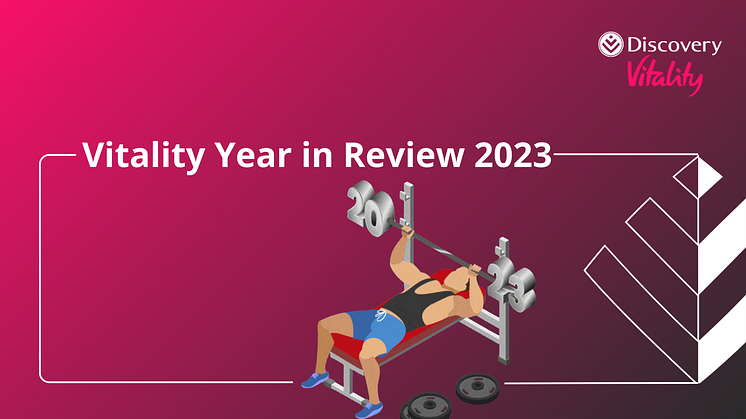
Press release -
Walking 5,000 steps three times a week could add three years to life expectancy
· Research conducted by Vitality and the London School of Economics, covering over one million Vitality members across South Africa and the United Kingdom, finds enormous health benefits from habitual physical activity, even at low volumes.
· Sustaining a healthy habit has a disproportionate impact on health as people age: for people older than 65, mortality rates decrease by as much as 52% as physical activity increases.
· The study establishes principles for creating a healthy habit that could significantly reduce healthcare costs, paving the way for targeted, incentivised behaviour change.
Watch the webinar recording here.
12 March 2024, Johannesburg: New research by Vitality and the London School of Economics shows that walking at least 5,000 steps three times a week is a milestone habit that, when maintained for two years, can add up to three years to a previously inactive individual’s life expectancy and reduce their healthcare costs by up to 13%.
Shared by Discovery Chief Executive Adrian Gore in London today, this new research study titled ‘The Vitality Habit Index’ is a comprehensive analysis of how people make and break habits for better health, as well as the impact on individuals and society. The study mapped the physical activity and nutrition behaviours across one million Vitality members over a 10-year period to determine the best ways to form and maintain healthy habits, and to understand the science of how healthy habits can lead to longer, healthier lives.
Globally, insufficient physical activity is associated with up to five million premature deaths every year; and estimates suggest that one in five deaths are now associated with poor diet, with 1.5 billion people predicted to be obese by 2035.
The WHO estimates that 27.5% of adults and 81% of adolescents are physically inactive. If this level of inactivity maintains, new cases of preventable non-communicable diseases (such as type 2 diabetes) will cost health systems US$27 billion each year.
As countries around the world deal with the strain of rising disease risks and treatment costs, the Habit Index research sheds light on the small changes that people can make to improve their health and the significant impact that habitual physical activity could have to make global health systems more resilient and sustainable.
The impact to the individual
Small changes to create and sustain healthier habits could have a significant impact on individuals’ health outcomes. Major positive impacts were seen across all age groups; however, this was particularly true for older generations, showing that it’s never too late to start. People 65 and older saw a 52% reduction in their mortality risk after sustaining a habit of 7,500 steps three or more times per week. This is significantly greater than those aged between 45 and 65, who saw a 38% reduction in their mortality risk, and the total population, who saw a 27% reduction.
The research indicates that doing 7,500 steps per day on average achieves the bulk of the reduction in common-cause mortality; with additional incremental health improvements beyond this “sweet spot”. On average across all age groups, those who sustain a healthy physical activity habit – physical activity three times per week for more than two years – can add between 2.5 years (for men) and three years (for women) to their life expectancy.
A habit of physical activity lowers risk of type 2 diabetes and cancer
The research analysed the impact of forming and sustaining a physical activity habit on an individuals’ risks of developing type 2 diabetes and severe cancer.
It is estimated that 529 million people have diabetes globally, costing billions in treatment costs each year. The Habit Index showed people who sustain a habit of physical activity on three days a week for three years can reduce their type 2 diabetes risk by up to 41%. Similarly, there are major benefits for those with the condition already. A 55-year-old with type 2 diabetes who changes from limited physical activity to sustain a habit of 5,000 steps three times a week, reduces their all-cause mortality risk by 40%.
When it comes to severe cancer, the research also showed promising results among Vitality members who changed their behaviour from being unengaged to sustaining at least medium levels of physical activity to reduce their risk of stage three cancer by 19% and stage four cancer by 36%.
Forming and sustaining a habit of physical activity for three days a week was also associated with a 10% reduction in in-hospital healthcare costs, and a 13% reduction when sustaining an average of more than three days of physical activity in a week (regardless of intensity) for two years.
Good habits are correlated: Findings from Vitality’s HealthyFood benefit
Part of the analysis included nutrition habits of 200,000 Vitality members using the HealthyFood benefit in South Africa.
While single Vitality members and couples without children are the most likely to have good nutrition habits, good nutrition habits are highest among Vitality members who are 65 years and older.
Exercise and nutrition habits are positively correlated: Vitality members who had a good physical activity habit were 11 percentage points more likely to have a good nutrition habit, and over one-third of Vitality members who took up the HealthyFood benefit developed a better physical activity habit.
Incentivising and sustaining healthy habits
The Habit Index sheds light on the science of habit formation to understand how we can build strong exercise habits and improve health. Findings suggest that it is frequency and consistency of physical activity, rather than the intensity, that has the most health benefits. Lasting physical activity habits are formed gradually, in laddered increments, starting with a lower target. So, rather than relying on a sudden, intense physical activity routine, the key lies in consistently integrating manageable, low to moderate intensity activities over time.
Based on the research, three rules for creating robust habits emerged:
- Start low and slow – don’t be too ambitious. Individuals who start with low- to moderate-intensity exercise at low frequency are likely to maintain their habit 1.5 times longer compared with those who start with high-intensity workouts.
- Use “habit laddering” – set a target from your baseline. Set the target based on aims and existing health status, for example, when inactive, starting with 2,500 steps three to five times a week is the “first step on the ladder”.
- Focus on consistency then intensity. Keep up the activity to form the habit and only increase the intensity once the action has been repeated for between six and eight weeks.
The fundamental challenge in embedding a preventative approach to health lies in the gap between what we know we should do to remain healthy and what we do. The Habit Index findings demonstrate that habit formation can unlock significant cost savings and increased life expectancy, yet currently less than 5% of healthcare spending goes towards preventive healthcare services. Renewed focus on prevention, coupled with this scientific understanding of how to form and sustain habits will help people live longer, healthier lives.
Adrian Gore, Founder of Discovery Vitality, said: “Healthy habits can profoundly extend the quality and length of life. Our data shows the impact is not only significant but applies across ages, risk factors, and health statuses – maintaining a small amount of physical activity has lasting health impacts. Given the role of behaviour in health risk globally, a better understanding of the mechanisms of habits can be a powerful way to improve individual health – and to evolve our healthcare systems to prioritise preventive health.”
Dinesh Govender, Discovery Vitality CEO, said, “The Vitality Habit Index gives scientific insight into what constitutes a healthy habit, how to increase the chances of successfully developing it, and why it is beneficial to individuals and to society. What I find encouraging is the ability to immediately act on the research’s findings that forming even the smallest healthy habit at any age can be life changing. For example, a 65-year-old can reduce their mortality rate by over 50% just by walking 7,500 steps three or more times a week.”
Professor Joan Costa-Font, London School of Economics said: “The findings of this study are a clear call to action for policy makers to promote prevention in public health and build on the power of healthy habits to improve individual and collective health outcomes. Successful habit-based interventions can lengthen life expectancy, entail considerable savings for public health services, improve productivity, and help address the significant long-term challenges posed by mental health, social isolation, and non-communicable diseases such as cancer and type 2 diabetes.”
Notes to editors:
Methodology
Recognising the pivotal role that habits play in shaping health outcomes, Vitality has developed a data-driven tool to quantify habit formation: the Vitality Habit Index.
In total, the study looked at the habits of over one million Vitality members across South Africa and the UK over a ten-year period, mapping their behaviours to understand how to make healthier habits, and consequently displace unhealthy habits.
This tool scientifically defines habits using verifiable data related to physical activity and nutrition. Vitality built a predictive model per member using the previous six weeks of a member’s data to predict the behaviour or action in the seventh week, and thus understand how well past behaviour predicts future behaviour.
Through its development, Vitality aims to understand the impact of lifestyle choices and behaviours on health, understand why individuals struggle to adhere to exercise goals, identify how to cultivate healthy habits, and discern which habits are more likely to endure.
ENDS
Related links
Topics
Categories
Discovery information
About Discovery
Discovery Limited is a South African-founded financial services organisation that operates in the healthcare, life assurance, short-term insurance, banking, savings and investment and wellness markets. Since inception in 1992, Discovery has been guided by a clear core purpose – to make people healthier and to enhance and protect their lives. This has manifested in its globally recognised Vitality Shared-Value insurance model, active in over 40 markets with over 40 million members. The model is exported and scaled through the Global Vitality Network, an alliance of some of the largest insurers across key markets including AIA (Asia), Ping An (China), Generali (Europe), Sumitomo (Japan), John Hancock (US), Manulife (Canada) and Vitality Life & Health (UK, wholly owned). Discovery trades on the Johannesburg Securities Exchange as DSY.
Follow us on X @Discovery_SA
About Vitality
Vitality is part of Discovery Limited, a worldwide insurer and investment manager impacting more than 30 million lives in over 40 markets, across Europe, the Americas, Asia, Africa and Oceania.
Vitality pioneered the ‘shared-value’ insurance model, a unique approach based on the scientifically proven principles of behavioural economics. Through this model, Vitality helps members take a more active role in managing their own wellness, encouraging them to develop healthy long-term habits that are good for them, good for the company and good for society. The effect is positive for all stakeholders – members benefit from better health, financial rewards and additional incentives; employers benefit from healthier, more productive, and more engaged employees; and Vitality benefits from a healthier membership base.
Follow us on X @Vitality_SA





